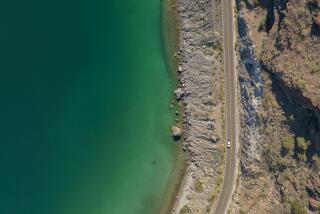When the Mercury Rises, so Does a Uruguayan Hot Spot
PUNTA DEL ESTE, Uruguay — Every summer, Argentina invades Uruguay.
The invasion begins in December, the start of South American summer, and lasts until March. It is generally amicable, if ostentatious. Well-to-do Argentines lead the way, with reinforcements from Brazil and Paraguay and, increasingly, expeditionary brigades of Europeans and Americans.
The beachhead is this peninsular town located where the Rio de la Plata flows into the Atlantic. Punta del Este has been an exclusive resort for decades, and a new airport and luxury hotel with casino are making it more international.
For three high-rolling months, Punta is a whirl of fashion shows, beauty contests, million-dollar parties. The season offers a parade of supermodels and wannabe starlets; tycoons and paparazzi; pseudo-celebrities and semi-celebrities and even a few real ones.
So Punta is both appealing and a bit obnoxious. One of the most pleasant vacation refuges in Latin America also has become a mecca of consumption and superficiality where even the beaches have their own public relations agents.
In hopes of realizing Punta’s long-deferred dream of becoming another Monte Carlo, local promoters routinely pay the likes of Tony Curtis and Pamela Anderson to fly down and be seen.
“Even foreign stars would prefer not to pay their own way,” said Alfredo Etchegaray, a reigning public relations mogul. “Nobody wants to pay. It’s natural. And if we get foreign stars, we become more fashionable.”
Unfortunately, a January visit by Anderson ended disastrously soon after it began. When the former “Baywatch” star showed up for a beach event, a beer-fueled mob of well-to-do young men and adolescents went berserk. Shouting obscene proposals, they stampeded toward Anderson, overwhelming her bodyguards and forcing her to flee.
The melee caused a lot of head-shaking because Punta rarely gets that rowdy. But the line between big shots and scoundrels sometimes blurs here. Uruguay’s remoteness, banking secrecy and tolerance of refugees have made it a haven for fugitives and fortunes of dubious provenance.
There was the French politician accused of embezzling who fled his country, settled in a mansion in Punta and became a model citizen. There were the Basques who ran the best seafood restaurant in town--until they were arrested and extradited to Spain on charges of being terrorists from that nation’s leading illegal separatist group.
And the prize anecdote for corruption-weary Argentines from the summer just ended: A vacationing Argentine judge was arrested after a supermarket security guard caught him allegedly trying to shoplift underwear and deodorant. He said he was returning the items for two repentant teenagers, and charges were dropped because the items were valued at less than $50. The judge went home and resigned.
Punta del Este is not all unrestrained appetites and rampaging glitz, however. This summer also featured literary readings, art exhibits and good music. A yearly jazz festival brings together top U.S. and Latin artists.
“We’re happy to have created a real cultural event, because people spend a lot of money on silly stuff in this town,” said Paquito D’Rivera, the U.S.-based Cuban exile who is the festival’s musical director. “They have gigantic parties and pay to bring in some character just so people can look at them. What could be sillier than that?”
But the promoters soldier on.
“Punta has to appeal to different kinds of markets,” said Etchegaray, whose family is among Uruguay’s landowning elite. “We have to offer both the frivolous and the intellectual, the tame and the wild, like the beaches.”
The coast first became an upscale outpost in the 1930s. Argentines gravitated here because the beaches were more scenic and secluded than those of the Argentine coast around Mar del Plata, a bastion of middle- and working-class vacationers. Today, the Uruguayan coast draws several hundred thousand visitors a summer.
About 10 years ago, Argentina’s then-secretary of tourism, Omar Fassi Lavalle, launched a campaign urging his countrymen to do the patriotic thing and spend the summer enjoying the “marvels of Argentina.”
But the campaign disintegrated when Lavalle was photographed dancing in a discotheque in Punta del Este.
More to Read
Sign up for Essential California
The most important California stories and recommendations in your inbox every morning.
You may occasionally receive promotional content from the Los Angeles Times.










